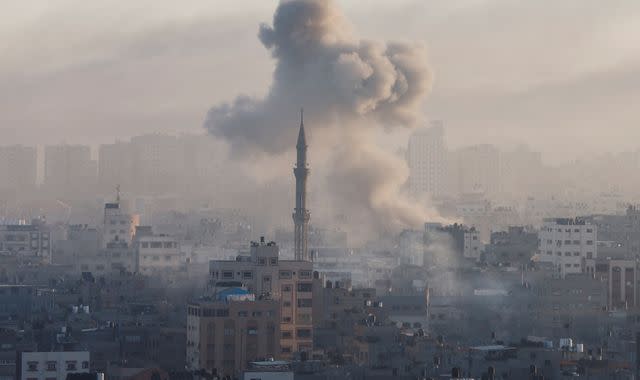This is a dangerous moment in Israel-Hamas war - and the rest of the world is holding its breath

We might think we've seen it all before - airstrikes, flattened buildings, funerals, inflamed rhetoric on both sides.
But make no mistake, this time is different. And what happens next is hugely important for the region and the world. It is a dangerous moment.
Black Saturday, as the Israelis call it, has changed everything - for now at least. Rightly or wrongly, Israeli officials believe the threat this time may become existential. That fear will determine what they do next.
That may seem over the top. However horrendous and barbaric, the attacks were limited to one small area and Israel is a mighty country with powerful friends.
But what happened that day has undermined the mystique of Israel's military superiority. Its deterrence is hugely weakened and that could destabilise the region to the point of much wider conflict.
Follow live: Gazans told 'go south if you want to live'
Since its inception, Israel has tried to project strength to survive among neighbours who want to destroy it.
Its forces have prevailed over Hamas in all previous conflicts. In its only war with Hezbollah in 2006, its military was effective enough to deter any provocation by the Lebanese Shia resistance militia since.
But on Saturday, Israeli soldiers were slaughtered in their beds, militants on motorbikes overran the IDF in its bases.
Videos filmed by Hamas seen across this region show Israelis in uniform begging for mercy, or lying dead. An untold number of Israeli soldiers were taken hostage.
Hamas transformed itself into an effective guerrilla fighting force and got the better of one of the world's strongest armies.
The impact of all that is hard to overstate. Far from invincible, Israel's army had been exposed as vulnerable and in this rough neighbourhood that could be disastrous.
So there is one overriding priority for Israel - to restore the power of its military deterrence. As it moves in on Gaza, everything else will be secondary. Its own rules of engagement have changed.
More Israeli soldiers will die in this war than before, officials have already said. Cabinet ministers are saying the same about Israeli hostages being held in Gaza.
Israel's sacred principles of protecting its own and leaving no one behind will be subordinate to the mission to destroy Hamas. That is a major break from the past but unavoidable, its leaders believe.
Likewise with civilians in Gaza. Israel has in the past taken more precautions than other militaries to avoid unnecessary loss of civilian life, though critics will say not nearly enough.
The military is already warning the scope of its offensive will make it harder this time to avoid collateral damage.
This is Israel's dilemma: show too much restraint and risk failing to restore its deterrence. Go too far and risk losing the support of allies and inflaming passions among enemies further afield, drawing them in to a far wider war.
Read more:
Gaza 'on brink of collapse'
'Highly likely' British hostages held by Hamas
Britain, France and the deep roots of the Israeli-Palestinian conflict
Unprecedented scenes of suffering in Gaza may prompt Israel's foes to escalate this conflict. Iran has warned as much.
Its proxy militia, Hezbollah, may already be tempted to exploit Israel's weakness and awaiting the right moment to strike.
Israel's concerns are shared by its allies. They know a weakened Israel destabilises the region.
A major war in this region is bad news at the best of times but with one big conflict already under way in Ukraine, another in the Middle East would be extremely dangerous geopolitically, as well as threaten global recession.
So leaders and diplomats are rushing to the region, offering support for Israel while urging caution in private.
America, Britain and others are sending warships and military assets to counter the threat of Hezbollah or Iran, or others getting involved.
As Israel prepares to storm Gaza, the rest of the world is holding its breath.


